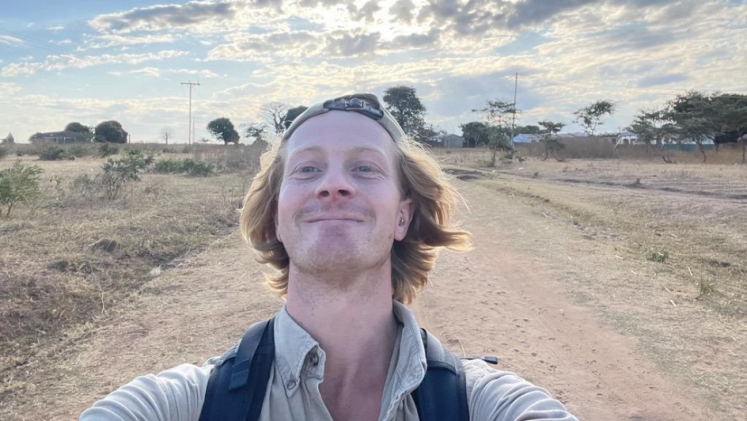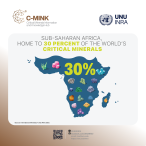Who: Edward Sparkes, Research Associate – Systemic Risk and Climate-resilient Development
When: from 1-15 August 2023
Where: Malawi and South Africa
Why: Identifying cascading effects of the COVID-19 pandemic and developing systemic risk management approaches to build climate-resilient development pathways in the Southern African Development Community (SADC)
In an increasingly interconnected and globalized world, COVID-19 has been a drastic reminder of the systemic nature of risks. Over the course of the pandemic, COVID-19 had severe and wide-ranging consequences for societal systems, which were often intensified by the simultaneous occurrence of climate-related events and natural hazards.
Within the context of the CARICO SADC project, Edward Sparkes, UNU-EHS expert on systemic risks and adaptation pathways approaches, travelled to Malawi and South Africa. There, as part of the project team he co-organized stakeholder workshops and held expert interviews on systemic risk management and pathways to recovery from the pandemic. These workshops were the second series held in the project, building on and validating results from previous workshops where cascading and systemic impacts of COVID-19 and concurring hazards were identified.
How have cascading impacts from the COVID-19 pandemic affected communities in the research area?
In South Africa and Malawi, the impacts have been twofold. Firstly, communities faced the immediate effects of the pandemic, such as direct health impacts. Secondly, we observed many cascading impacts that have been identified through the participatory development of “Impact Webs”, a novel methodological tool designed to better understand and characterize complex risks, such as compounding, cascading and systemic risks. This methodology identifies risks beyond the immediate effects of a hazard, by mapping the widespread impacts across sectors. The participatory development of Impact Webs in South Africa and Malawi not only assessed the pandemic’s impact on specific sectors like agriculture or education, but comprehensively examined how risks and their underlying drivers are interconnected across sectors, ultimately characterizing effects on the entire country.
Take for instance the closing of schools. Children were not among the most vulnerable groups in respect to COVID-19 health impacts. However, the lockdowns and school closures greatly affected their access to education, particularly for girls. Cascading effects in both Malawi and South Africa included an increased dropout of girls in education, as well as an increase in child marriages and gender-based violence.
How do the identified lessons contribute to risk management and recovery strategies for future hazard and shock events?
Valuable lessons were identified from our work in the CARICO SADC project that are relevant to other hazards. The second set of stakeholder workshops identified a number of them. When developing risk management and recovery policies, there is a strong need to consider pre-existing vulnerabilities: Those who were already marginalized before based on factors such as gender, age or disabilities, tended to be impacted even harder by the effects of the pandemic, which widened inequality. Another significant insight underscored the importance of cross-border cooperation within the SADC. The closure of borders disrupted trade, communication, and transport links, which all are vital elements in emergency responses to climate-driven hazards such as tropical cyclones. An additional finding was the disparity between the development of policy plans at the national level and their implementation at the district level in both Malawi and South Africa. While there were strong disaster preparedness and response plans as well as risk management policies at the government level, the workshop revealed that these did not always filter down to the local level. This underlined the need for a collaborative process and strengthened risk communication between government and district authorities and communities to ensure effective implementation.
How did the fieldwork contribute to improving risk management and recovery pathways?
The first workshops held in June 2023 documented risks and impacts from COVID-19 and other hazards through utilizing the Impact Webs methodology. During the second workshop we presented the Impact Web outcomes – i.e. conceptual risk models - to stakeholders and asked them to validate the findings. Using these conceptual models, stakeholders identified entry points for risk management and policy recommendations, documenting where negative cascading effects could be broken and where positive effects could cascade across multiple sectors. The workshop exercise helped participants to identify the transformations needed to move from the present-day situation into a more resilient future, documenting risk management options for the short term, as well as for the medium and long term.
Why is this type of fieldwork important?
We know that stakeholder engagement is crucial for success. We can read and learn about existing knowledge and knowledge gaps, but entering the field to talk with stakeholders, understand their perspectives and build on their expertise to co-create knowledge on how to improve resilience in their countries is extremely valuable as it creates a sense of ownership of findings and recommendations.





